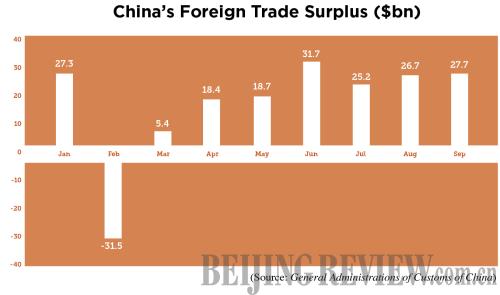|

Three months of consecutive drops in imports ended in September. Imports were up 2.4 percent from a year earlier to $158.68 billion, according to GAC data.
Chen said import demand has built up on China's pro-growth policies and will continue to increase in the fourth quarter.
Chinese authorities have beefed up incentives to expand imports in order to balance the country's trade.
The government said in early October that it would allocate 2.5 billion yuan ($399.5 million) from the central budget to offer low-interest loans to importers of certain products this year.
In September, China's trade surplus rose slightly to $27.67 billion from $26.66 billion in August, the GAC said.
Li predicted that the trade surplus will expand somewhat, but will not take up a larger share of China's total trade or economic output.
Wang Jun, an expert with the China Center for International Economic Exchanges, forecast "relatively severe difficulties" in China's foreign trade for the next one to two years.
In the longer term, China is not likely to maintain the annual export growth of 20-30 percent seen in previous years because global demand simply cannot support it, Wang said.
Instead of relying entirely on external markets, China should strengthen its export industry by offering more tax rebates, cutting logistics costs and raising the efficiency of labor, he urged.
"Despite upbeat foreign trade figures in September, a rebound in China's exports has yet to take hold," said Liu. "We'll wait and see how foreign trade develops in the future. The Chinese Government's pro-growth policies in foreign trade will be tested at this year's Canton Fair."
Tasks and risks
China is at a crossroads and is confronted with a number of challenges, including sustaining growth, shifting the focus of its economy and curbing inflation, said an analytical report on China's macroeconomy, released by the Institute of Economic Research at Renmin University of China on September 22.
"Market-oriented economic growth and sustaining growth by structural adjustment should be the top choices for the country," said the report. "Meanwhile, further urbanization and industrialization are feasible ways to realize those goals."
"In the short run, sustaining growth should be the top priority," said Wang Yu, Deputy Director of the Research Bureau of the People's Bank of China, the country's central bank.
"However, in the long run, pushing forward economic reform is most important because long-term economic development depends on how well reforms are carried out in the country," Wang said.
Email us at: zhouxiaoyan@bjreview.com | 